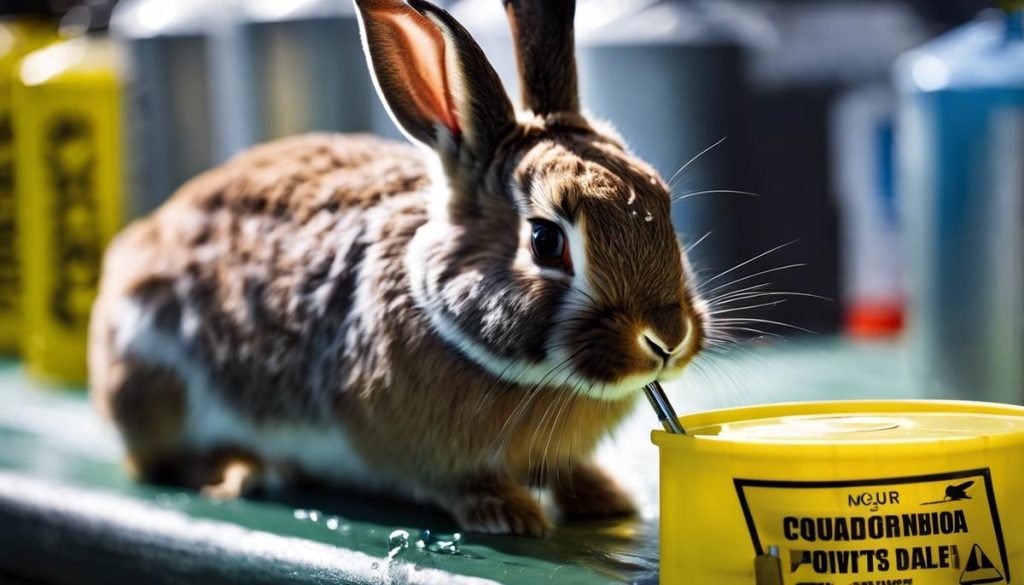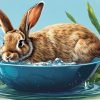Rabbits are known for their adorable antics and loving nature, forming an integral part of many families, much like a cherished household pet. In our attentive care for these furry companions, we must consider all facets of their well-being, including their hydration. While we often worry about them getting enough water, especially in the heat of summer, it is equally important to understand that a rabbit can also face health issues from excessive water intake. This essay dives into the less-discussed territory of overhydration in rabbits, offering a comprehensive guide to recognizing signs of abnormal water consumption. By the end of this exploration, rabbit owners will be equipped to ensure their hopping housemates strike a perfect balance in their water habits, safeguarding their health and happiness.
Recognizing Signs of Excessive Water Intake in Rabbits
Hey there, fellow family-focused folks! If you’ve recently added a little hoppy friend to your family mix, you might be wondering about their water habits. Just like with our kiddos, it’s important to ensure our furry friends are getting just the right amount of hydration—neither too little nor too much. Now, you might be scratching your head thinking, “How much is too much for a bunny?” No worries, let’s dive right into it.
Here’s the scoop: a typical rabbit should drink water that’s approximately 10% of their body weight daily. So, if you’ve got a cuddly critter that’s about 2 kilograms, that little one should sip around 200 milliliters of water each day. But hey, if you notice your bunny is constantly at the water bottle or bowl, it could be a sign of something more going on. Overdrinking can be a little red flag waving at you, possibly signaling urinary tract issues, kidney disease, or even diabetes. Who knew these cute fluffballs could share some similar health concerns as people do, right?
Now, don’t become a water warden just yet. Keep a calm, close eye on your bunny’s water consumption. If there’s a noticeable spike and it’s accompanied by changes in appetite, unusual bathroom habits, or any other odd behavior, it’s definitely time to have a chat with a vet. Responsible pet parenting is a lot like the attentive care we give our kids—it’s all about balancing love, caution, and care to keep everyone in the family, furry or not, happy and healthy. Cheers to that!

Understanding the Causes and Solutions to Overhydration
As nurturing guides for our cuddly companions, understanding the intricacies of their needs is paramount. With water being such a crucial part of a rabbit’s diet, it might come as a surprise that overhydration is a real concern. This excessive water intake can often stem from dietary imbalances. If a rabbit’s diet is too low in fiber or too high in water-rich vegetables, they might drink less water than necessary, leading to a skewed perception of what constitutes too much upon increasing their water consumption. Similarly, just as in humans, a rabbit’s desire for water can increase due to certain medications or health conditions, making it all the more important to stay attuned to their habits.
Managing overhydration in rabbits involves a delicate dance – much like choreographing family life. The quality and type of feed play a crucial role here. Ensuring a high-fiber diet, primarily consisting of hay, helps regulate a rabbit’s need for water. Moreover, moderation is key when providing vegetables and fruits, another source of moisture. A watchful eye must be kept on their water bottles or bowls; consistent amounts should be provided daily, allowing patterns of consumption to be easily noticeable. If an increase is observed, a consultation with a veterinarian can identify any underlying health issues and provide guidance for a balanced diet that meets all their nutritional needs while avoiding excess hydration.
Connecting with fellow caretakers through stories of shared experiences, tips, and encouragement opens the door to a world of support. So, when it comes to our fluffy friends, remember, they rely on us to set the tempo of their health and happiness. Together, let’s ensure every hop in a rabbit’s step is one filled with well-being.

Ensuring the health and well-being of our rabbits encapsulates myriad responsibilities, of which monitoring their water intake is a vital component. By staying vigilant and observant, we can safeguard against the risks of both dehydration and overhydration. Our furry friends rely on us to interpret their behaviors and respond to their needs, and understanding the delicate balance of their water consumption is integral to providing the best care possible. Armed with the knowledge of how to recognize the signs and address the causes of excess water intake, rabbit owners can foster a nurturing environment that supports their pets’ health and vitality for years to come.



